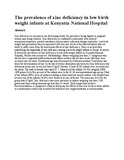| dc.contributor.author | Tsikhutsu, I | |
| dc.date.accessioned | 2012-11-13T12:42:55Z | |
| dc.date.available | 2012-11-13T12:42:55Z | |
| dc.date.issued | 2004 | |
| dc.identifier.uri | http://erepository.uonbi.ac.ke:8080/handle/123456789/6358 | |
| dc.description | (data migrated from the old repository) | |
| dc.description.abstract | Background:
Zinc deficiency is common in the developing world, the prevalence being highest in
pregnant women and young children. Zinc deficiency in childhood is associated with
reduced immmunocompetence. growth retardation and increased infectious disease morbidity. Low birth weight and prematurity may be associated with low zinc levels in the affected babies who are likely to suffer more from the deleterious effects of zinc deficiency. There is no local data quantifying the magnitude of zinc deficiency among low birth weight infants in Kenya. A survey to determine prevalence of zinc deficiency in low birth weight infants in Kenyatta National Hospital, Nairobi was carried out.
Methodology:
Babies weighing less than 2.5 kilograms who did not have congenital malformations and
whose mothers did not have acute infections were recruited into the study. Gestational
age was determined by Dubowitz method. Cord blood was taken for determination of
zinc by the use of atomic absorption spectrometry.Zinc deficiency was defined as
serum zinc levels less than 65!lg/dl.
Results:
A total of 302 infants were recruited into the study. The male to female ratio was 0.9: 1.
Majority of the infants (34.4%) weighed 1000-1499 grams.Sixty five percent of the infants were in the 32-36 weeks gestational age group. Most of the infants (69%) were of mothers residing in slums and low-income estates. One hundred and seventy one of
the infants (56.6%) were found to be zinc deficient. The mean zinc level for the group
was 62!lg/dl. Zinc deficiency was more prevalent in infants weighing less than 1500
grams and those with gestational age less than 32 weeks. Birth weight and mother's
Recommendation:
A prospective study to determine the effects of low zinc levels in these infants or a
randomised control trial to assess the benefit of zinc supplementation is recommended. | en_US |
| dc.language.iso | en | en_US |
| dc.publisher | University of Nairobi, CHS, Kenya | en_US |
| dc.subject | Zinc deficiency diseases | en_US |
| dc.subject | Birth weight -- Low | en_US |
| dc.title | The prevalence of zinc deficiency in low birth weight infants at Kenyatta National Hospital | en_US |
| dc.title.alternative | Thesis (M.Med.) | en_US |
| dc.type | Thesis | en_US |

